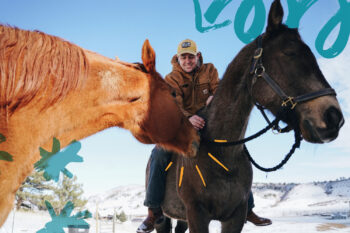Colorado’s Rural Communities Are Healthier Without Tobacco and Nicotine
Colorado’s Rural Communities Are Healthier Without Tobacco and Nicotine
Rural and frontier communities are harmed more by tobacco and nicotine than many other communities or groups. People who live in rural areas use tobacco more than individuals who live in urban areas. Rural residents also experience higher rates of health issues related to tobacco and nicotine.1 In fact, people in rural areas have 18-20 percent higher rates of lung cancer death than people who live in urban areas.2
It’s no mystery why our communities see tobacco’s worst effects. For decades, the tobacco industry has targeted young, rural men with its advertising. For more than 40 years, tobacco giant Philip Morris (now Altria) used its Marlboro Man character to associate its deadly products with the rugged independence of the American West. The industry has used other images, like cowboys, hunters, and race-car drivers to sell cigarettes and chewing tobacco3 — both in the media and at events frequented by rural men such as rodeos.
As a result of this industry targeting, today more people in rural areas smoke, and smoke more, than people living in urban areas.4

The Truth About Chewing Tobacco and Oral Nicotine Products
Because of the tobacco industry’s advertising, chewing tobacco and oral nicotine products are most popular with men living in rural and frontier areas.5 While some people might think chewing tobacco is healthier than smoking, these products are linked to mouth diseases, cancers, and other serious health problems. Chew tobacco can also lead to unpleasant side effects like bad breath, tooth damage, and gum disease.
Check whether you know the truth about chewing tobacco and oral nicotine products.
Get Help Quitting
When you quit tobacco, you choose better health overall. The Colorado QuitLine knows your time is important so they make it easy to get started by sending help right to you. When you use the QuitLine, you get free, confidential and direct support any time of day. Quit coaches will check in with you by phone or text and offer online planning tools and information to keep you on track. Free patches, lozenges and gum are also available to help you quit and can be sent directly to your home.
Thomas tried to quit many times in his life. It finally stuck once he realized that prioritizing his health was worth it.
You can talk to a coach who knows how hard quitting is and can help you make a plan that fits your needs. They can even send you free patches and gum.
Talk to a coach online today or call 1-800-QUIT-NOW (784-8669) today.
The Colorado QuitLine can offer convenient help anytime, anywhere.
Know Where To Go
Living in a small town, or off the grid entirely, has a lot of benefits. But living in more remote, open areas often means living further from a hospital or medical clinic. These websites can help with getting health insurance, accessing health care, or using telehealth services. And if you’re ready to quit tobacco, the Colorado QuitLine can help you at a distance with phone, text and web-based support.



